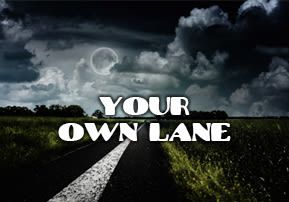
Shoftim: Your Own Lane
Every time the lady swerved out of her lane, she was skirting with disaster, liable to collide head-on with a car coming from the opposite direction…

"You shall not move a boundary of your fellow." (Deuteronomy 19:14).
Mike, a professional truck driver, was really perturbed at the lady in the Toyota in front of him. Her driving was erratic, sometimes fast and sometimes slow. She veered in and out of her lane as if she was intoxicated. But, as he could see, she didn't have a bottle in her hand. Instead, she was "intexticated", text messaging with her eyes darting back and forth between her Android and the hilly western Pennsylvania highway.
Because of the solid white line, Mike couldn't pass her. As it was, overtaking another car along the snake-like road would be risky. But this was only a two-lane highway. Every time the lady swerved out of her lane, she was skirting with disaster, liable to collide head-on with a car coming from the opposite direction. By an amazing stroke of Divine providence, she narrowly avoided several potentially horrific accidents…
Mike's prayers were answered. At the exit to Wilkes Barre at the top of the hill, a clearly marked Pennsylvania State Trooper vehicle stood on the side of the road. With her attention elsewhere, the lady in the Toyota didn't even notice the patrol car. Still texting, she skidded off the road for a moment and almost collided with it. As if nothing had happened and with Android still in hand, she kept on going. Mike saw the whole incident and slowed way down, enabling the patrol car to take off in front of him. With lights and sirens at full blast, the trooper chased her until she finally woke up startled and pulled over to the side of  the road.
the road.
After handing the state trooper her license and registration, she resumed text messaging again.
"Ma'am, put your phone down please. Shortly, you'll have plenty of time to contact whoever you like."
"What do you mean, officer? What did I do wrong?" shrugged the lady.
"Your driving is so dangerous, that you're a threat to yourself and to every other vehicle on the road. I can't let you continue driving like this. If you want to be tried right now in Wilkes Barre traffic court, then fine. If you want legal advice, you'll have to be detained in the meanwhile."
"Jail? What are you talking about, officer?"
"Ma'am, you've been tracked on radar. You were not only speeding but you've got at least four counts of reckless driving against you. Crossing a solid white line, forcing another vehicle off the road, texting while driving, and nearly colliding with a law-enforcement vehicle – this is for starters…"
"Officer, you're exaggerating; I did all that?"
"It's all documented, ma'am. We use technology to make our roads safer but some folks use it to make our roads more dangerous. We're talking about lives, so we can't tolerate breaking traffic laws. You were driving as if there were no solid white line in the middle of road. Do you know why the State paints lines on roads?" Without waiting for the woman's answer, the trooper said, "It's to keep people in their own lanes. That way, everyone gets to their destination in peace."
Modern highways all have lane demarcations. Otherwise, there would be chaos on the roads.
* * *
Our passage at hand is the prohibition against trespassing. We know that the Torah is economic in words. So, why doesn't the Torah simply say, "You shall not trespass"? Instead, it says, "You shall not move a boundary of your fellow," requiring nine words instead of four. Why?
There's a difference between simple trespassing and moving a boundary. A trespasser is one who violates the space of another person. One who moves a boundary is trying to steal the space of another person, a transgression that is much worse, for it carries the double punishment of both stealing and trespassing.
Even though, on surface value, the Torah is talking about the boundaries of the tribal-inheritance lands in the Land of Israel, the Torah is also giving each of us critically important spiritual advice for posterity. Namely, each person has his or her own "space", Divinely granted to them. This "space" is a person's own lane in life, his mission in life and the path to his personal rectification and realization of potential.
People have emotional "crashes" because they veer out of their own lanes in life, something that causes collisions with others. Consequently, whether it comes to career, to marriage, or to any other endeavor in life, we should stay in our own lane. That means serving Hashem with our own talents and aptitudes and not trying to be someone else. The key to happiness is staying in our own lane; that way, we arrive at our life's destination safely and with a big smile on our face.











Tell us what you think!
Thank you for your comment!
It will be published after approval by the Editor.